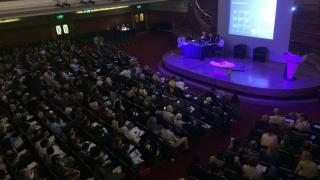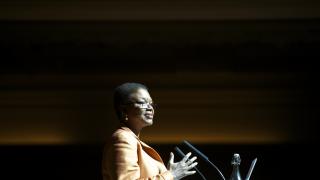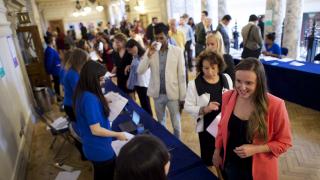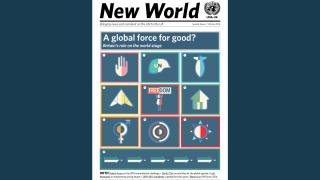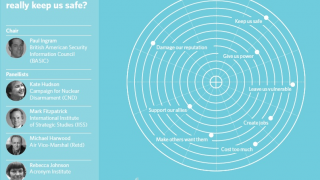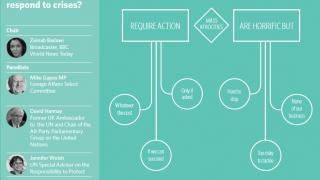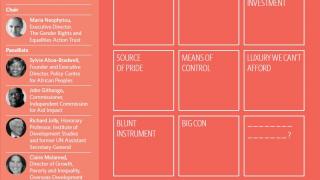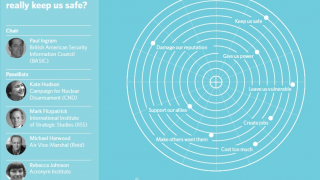
From the very first resolution of the UN General Assembly in 1946, governments have repeatedly endorsed the goal of a world free from nuclear weapons. Nearly 70 years on, the majority of the world’s population still lives in countries that have them, or are protected by those that do.
In the UK, there is broad, crossparty consensus on global disarmament, but here – as elsewhere – momentum has stalled in the face of increased instability around the world. With regard to the UK’s own weapons, the three main political parties have focussed on options for replacing the current Trident system. This debate is likely to heat up again around the time of the 2015 general election.
Campaigners, meanwhile, have called for it to be scrapped entirely, citing the dangers – and cost – of these weapons. Public opinion is not straightforward. Just three per cent of those we polled* felt a nuclear attack was one of the biggest threats facing the UK. But the most popular view on the country’s nuclear weapons – with 36 per cent – was “they keep us safe”.
Guided by Paul Ingram, whose organisation BASIC ran the Trident Commission, an independent, crossparty examination of the UK’s nuclear weapons policy, the panellists were given three minutes each to answer the question: do nuclear weapons keep us safe? Their main points are summarised here. Visit www.una.org.uk/forum for the full recording.
Mark Fitzpatrick, IISS Director of Non-Proliferation and Disarmament:
- Since 1945, the UK, and the West more generally, has experienced an extended period of peace. The UN deserves credit for this but so do nuclear weapons. Deterrence has been instrumental in preventing major wars.
- It is true that the world has been lucky to avoid nuclear war – doing away with these deadly weapons is a goal to be supported. But only if it can be done in a way that does not make us more vulnerable or open to conventional war. A nuclear-free world must be at least as secure as the one we have now.
- The UK has been the most progressive and transparent nuclear state, reducing its deterrent to just one delivery system. But others are not going down this path. Given current instability, now is not a propitious time to advocate nuclear disarmament.
- Nuclear weapons may not be useful for all the threats we face now, but what about tomorrow? If we are not sure of the answer, we should keep them as an insurance policy.
Michael Harwood, former UK representative to the UN Military Staff Committee:
- If we look back at the past five years, we realise how difficult it is to predict threats and instability. Going forward, we should be guided by three principles: anticipation, preparation and multi-level deterrence.
- Deterrence seeks to encourage better behaviour through fear of consequences. While diplomacy is the best way forward, there are times when universal values are threatened where it is our clearly explained readiness to use force – with statesmanship, not bravado – that will have an impact. Nuclear weapons have never been and should never be an ‘all-purpose’ deterrent. The UK needs a combination of soft power and hard power, with our seat on the UN Security Council playing an important role in both those areas.
- Other states are unlikely to care if the UK ‘goes to zero’. We need to think carefully about the next 50 years. We can go towards zero but we must watch carefully what others do, not just what they say or commit to.
Kate Hudson, CND General Secretary:
- Nuclear weapons have been designed to kill and destroy. By retaining them we are perpetuating an existential threat. Disarmament has been a widely recognised goal in the UK and internationally for decades, with many initiatives gathering momentum, such as on the humanitarian consequences of nuclear-weapon use.
- Unfortunately, the UK is hanging back, even though nuclear weapons cannot deal with the dangers we face. Take climate change, another existential threat. This is where we ought to be spending our money. Or terrorism – this cannot be tackled through nuclear weapons. It needs a foreign policy that strives for peace, justice and equality.
- Nuclear weapons only serve to institutionalise inequality and to perpetuate perceptions of double standards around the world.
- Most governments have been in agreement on disarmament for decades but nobody has the courage to take the first step – everyone is waiting for others to act. With the decision on Trident coming up, the UK is in a perfect position to show leadership.
Rebecca Johnson, Acronym Founder and Director:
- Did nuclear weapons ever keep us safe? What do we mean by ‘safe’ and who do we mean by ‘us’? There have been dozens of conflicts since 1945, involving nuclear and non-nuclear states. The world has avoided nuclear war by luck, not judgement.
- There are currently an estimated 16,000 warheads in the world. Reductions are welcome but not enough. These weapons pose multiple threats to our security, through accidents, miscalculation, cyber warfare or terrorist attacks. They are embedded in our security doctrines – do we really understand that words such as ‘countervalue’ mean the targeting of cities full of people?
- The UK and France perpetuate the notion that nuclear weapons confer power on smaller states and the ability to undertake ‘independent action’. States that aspire to nuclear weapons, often run by weak or despotic rulers, use the same arguments put forward by nuclear powers: deterrence, power, force projection, etc.
- These are not the weapons of the future. In the context of cyber attacks, our nuclear weapons aren’t just useless, they could be used against us.


